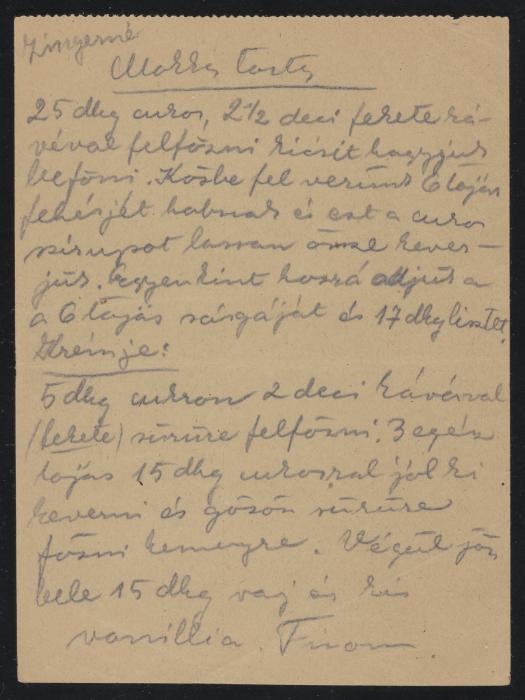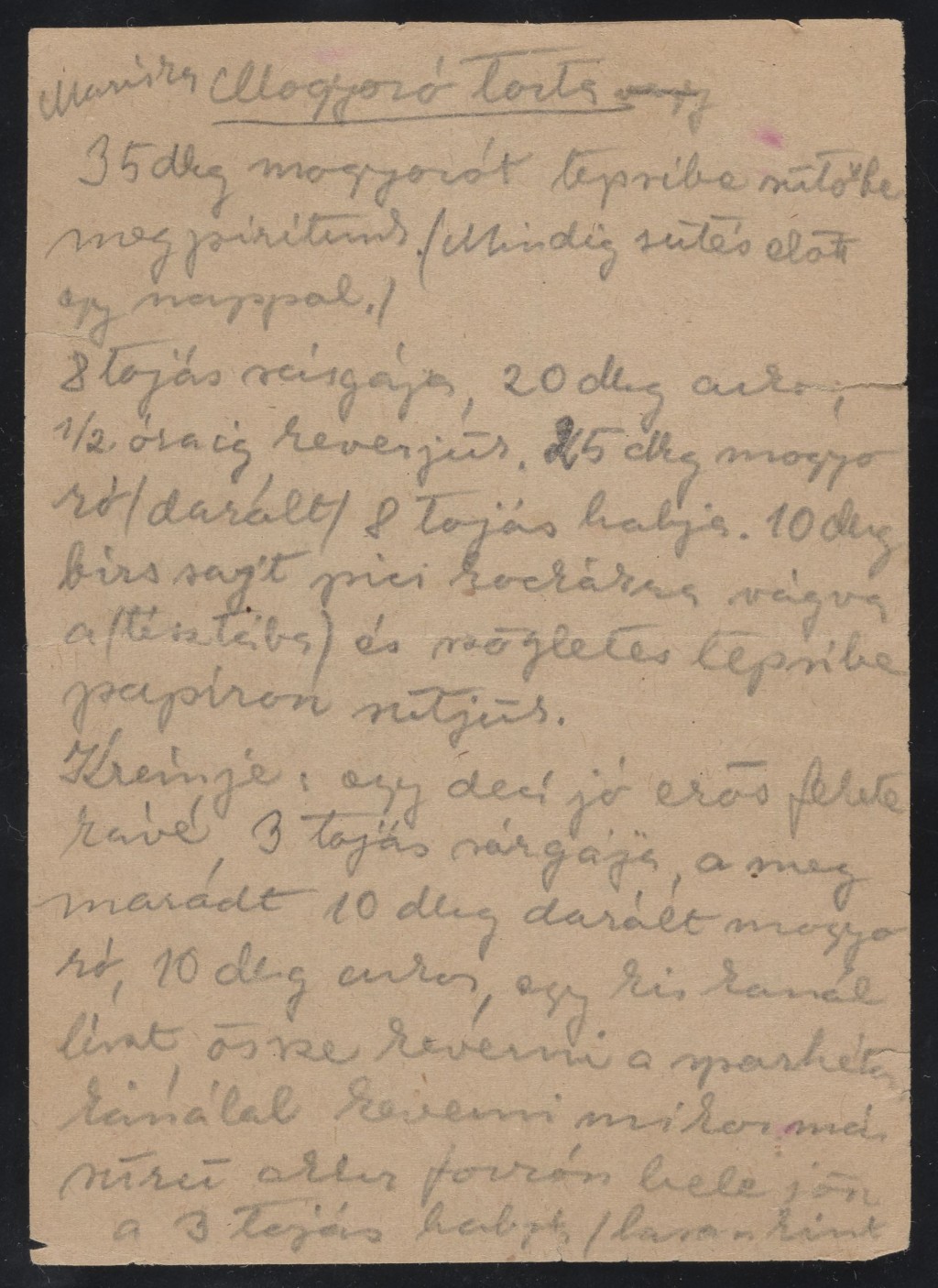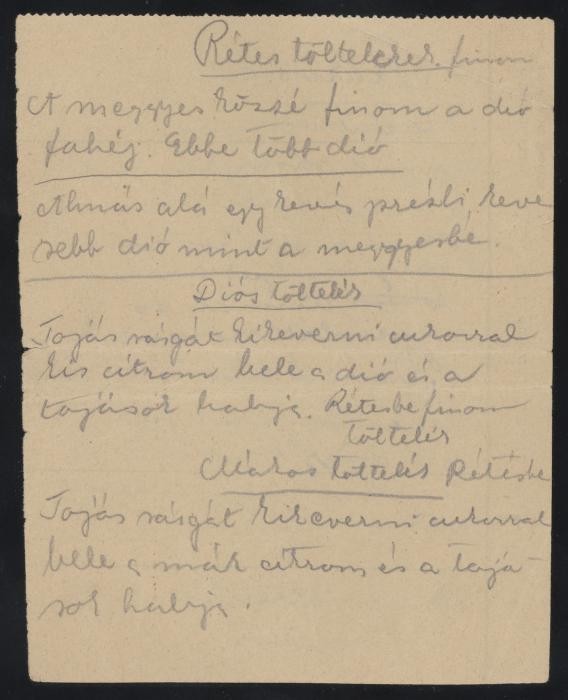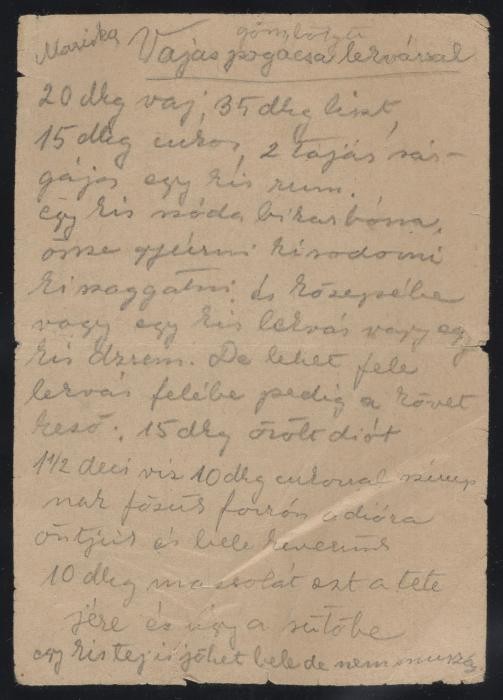Writing down treasured recipes can evoke memories of happier times and bear witness to the will to create under the most dire of circumstances. In some cases, this type of documentation was even a way to preserve a past that the Nazis and their collaborators were rapidly destroying. Ilona Kellner smuggled blank pages out of wastebaskets in a forced-labor camp and used them to record hundreds of recipes dictated by her fellow women prisoners, along with some of her own recipes.

Ilona Kellner and her family lived in Pelsöc, which became part of Hungary before World War II. Following the German occupation of Hungary, Ilona, her sister Vera, and her parents Karoly and Jolan were forced into a ghetto in another area of the town. In mid-June, the family was deported to the Auschwitz camp in German-occupied Poland. Ilona's parents were killed in the gas chambers at Birkenau.
In early August, Ilona and her sister were deported to Hessisch Lichtenau, a subcamp of the Buchenwald concentration camp. They were part of a transport of 1,000 Hungarian women taken to Germany to fill a labor shortage. At the labor camp, Ilona worked as a translator and messenger and tidied the factory there. She smuggled blank pages out of wastebaskets and used them to record hundreds of recipes dictated by her fellow women prisoners.
This page shows Mrs. Zinger's recipe for mocha cake, as transcribed by Ilona Kellner on the back of a blank munitions factory form.
Item View
Ilona Kellner and her family lived in Pelsöc, which became part of Hungary before World War II. Following the German occupation of Hungary, Ilona, her sister Vera, and her parents Karoly and Jolan were forced into a ghetto in another area of the town. In mid-June, the family was deported to the Auschwitz camp in German-occupied Poland. Ilona's parents were killed in the gas chambers at Birkenau.
In early August, Ilona and her sister were deported to Hessisch Lichtenau, a subcamp of the Buchenwald concentration camp. They were part of a transport of 1,000 Hungarian women taken to Germany to fill a labor shortage. At the labor camp, Ilona worked as a translator and messenger and tidied the factory there. She smuggled blank pages out of wastebaskets and used them to record hundreds of recipes dictated by her fellow women prisoners.
This page shows Mariska's recipe for hazelnut cake, transcribed by Ilona Kellner on the back of a blank munitions factory form.
Item View
Ilona Kellner and her family lived in Pelsöc, which became part of Hungary before World War II. Following the German occupation of Hungary, Ilona, her sister Vera, and her parents Karoly and Jolan were forced into a ghetto in another area of the town. In mid-June, the family was deported to the Auschwitz camp in German-occupied Poland. Ilona's parents were killed in the gas chambers at Birkenau.
In early August, Ilona and her sister were deported to Hessisch Lichtenau, a subcamp of the Buchenwald concentration camp. They were part of a transport of 1,000 Hungarian women taken to Germany to fill a labor shortage. At the labor camp, Ilona worked as a translator and messenger and tidied the factory there. She smuggled blank pages out of wastebaskets and used them to record hundreds of recipes dictated by her fellow women prisoners, along with some of her own recipes.
This page shows Ilona Kellner's recipe for various strudel fillings, written on the back of a blank munitions factory form.
Item View
Ilona Kellner and her family lived in Pelsöc, which became part of Hungary before World War II. Following the German occupation of Hungary, Ilona, her sister Vera, and her parents Karoly and Jolan were forced into a ghetto in another area of the town. In mid-June, the family was deported to the Auschwitz camp in German-occupied Poland. Ilona's parents were killed in the gas chambers at Birkenau.
In early August, Ilona and her sister were deported to Hessisch Lichtenau, a subcamp of the Buchenwald concentration camp. They were part of a transport of 1,000 Hungarian women taken to Germany to fill a labor shortage. At the labor camp, Ilona worked as a translator and messenger and tidied the factory there. She smuggled blank pages out of wastebaskets and used them to record hundreds of recipes dictated by her fellow women prisoners, along with some of her own recipes.
This page shows Ilona Kellner's recipe for "butter scones with jam," written on the back of a blank munitions factory form.
Item View
We would like to thank Crown Family Philanthropies, Abe and Ida Cooper Foundation, the Claims Conference, EVZ, and BMF for supporting the ongoing work to create content and resources for the Holocaust Encyclopedia. View the list of donor acknowledgement.